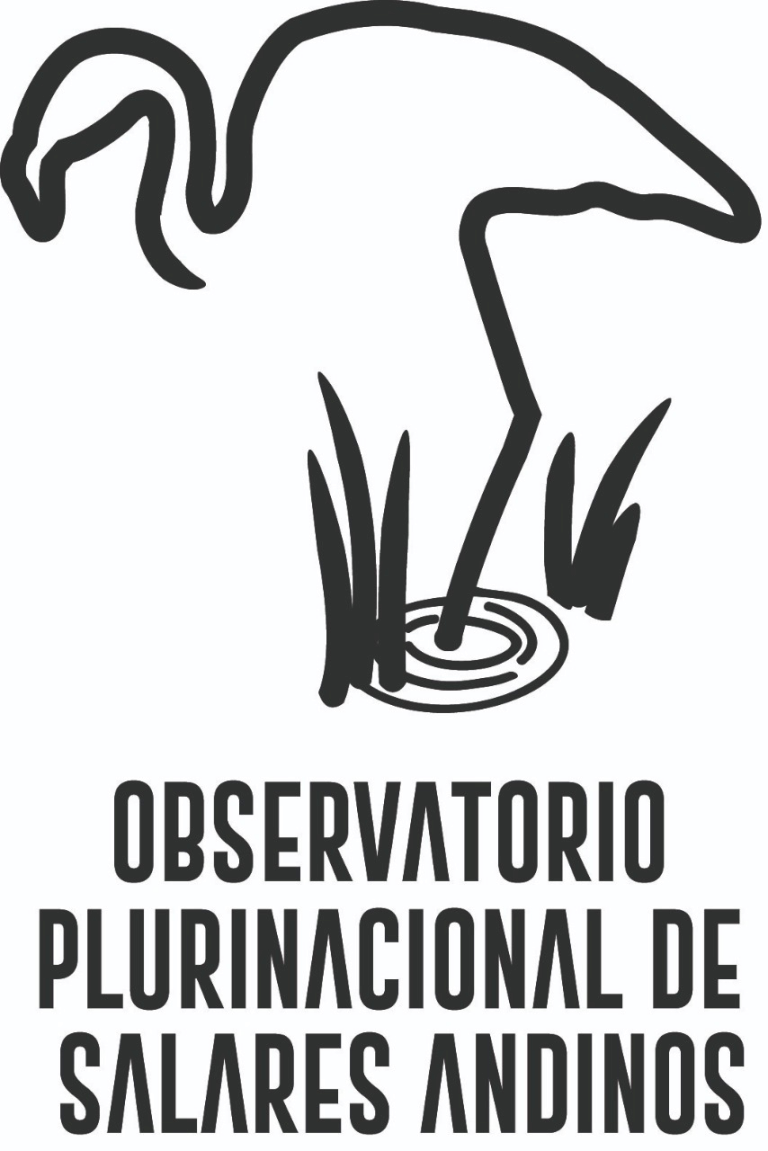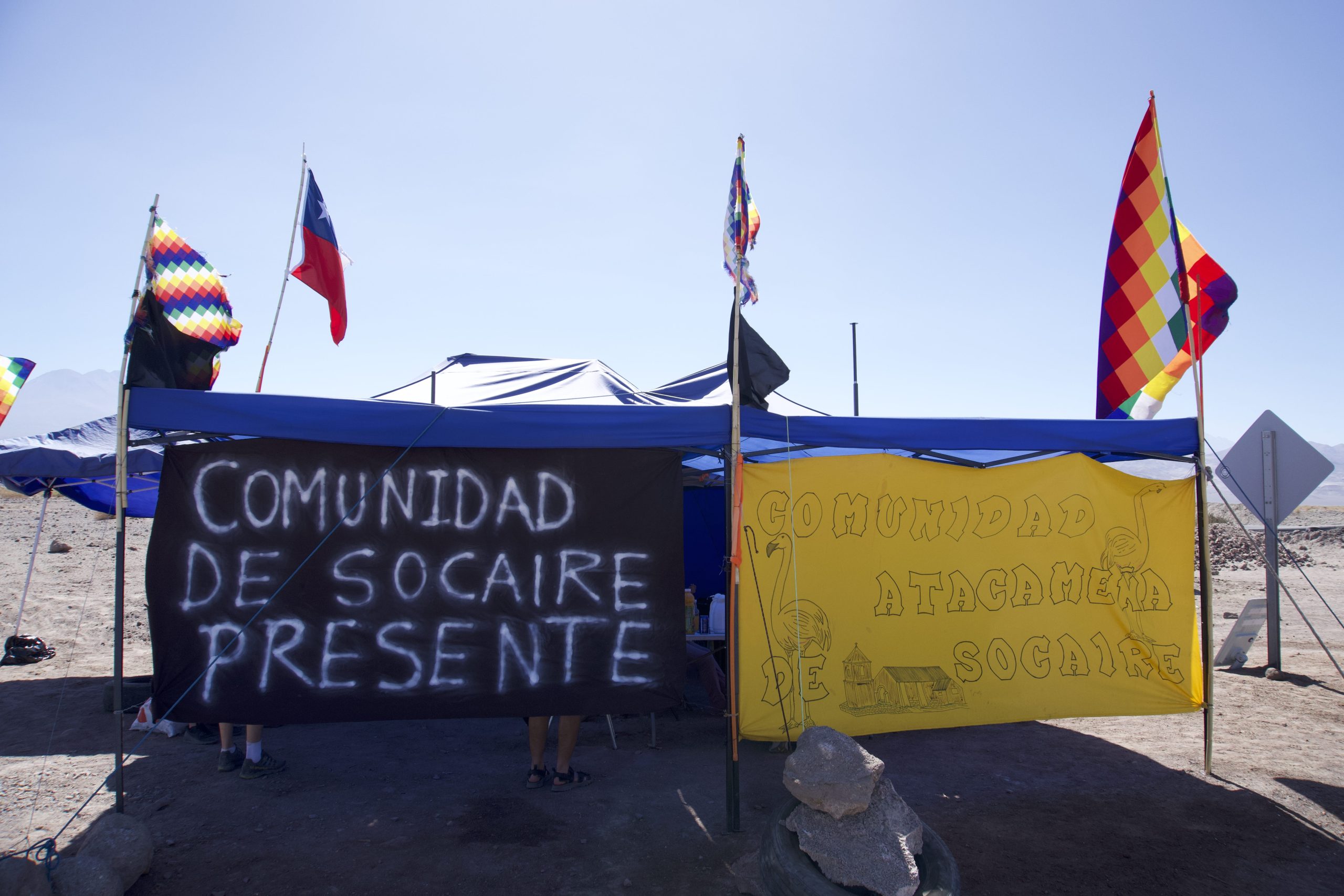A few days ago the Plurinational Andean Salt Flat Observatory (OPSAL) visited the camp that the Socaire community continues to maintain in the Atacama Salt Flat in opposition to the Memorandum of Understanding between CODELCO and SQM. The area is located on the outskirts of the SQM facilities, near the community. We spoke with some community members about their opinion regarding this pre-agreement, the visible damage that mining has caused in their territory, and the vision they have about the energy transition and electromobility.
Between January 9 and 14, 18 communities of the Council of Atacameño Peoples (CPA) mobilized against the pre-agreement between CODELCO and SQM announced last December, pointing out the lack of prior consultation. The protest included roadblocks to the Atacama Salt Flat, the source of 100% of lithium production in Chile, from mines currently operated by the companies SQM and Albemarle.
According to the CPA itself, as indicated in a statement published at the beginning of the mobilization, the occupation of access points to the salt flat was agreed upon by the communities of Toconao, Talabre, Socaire and Camar, later joined by the communities of Río Grande, Machuca, Catarpe, Quitor, San Pedro de Atacama, Solcor, Larache, Yaye, Séquitor and Checar, Cúcuter, Coyo, Toconao and Solor.
The demonstration had concluded on January 14, in response to the confirmation of the meeting between the Council of Atacameños Peoples (CPA) and the Minister of Mining, Aurora Williams, which took place on Friday, January 19, but of which no further details have been reported.
However, the Socaire community continues to hold its position in the salt flat, near the SQM base camp, where, according to the community members, the main freshwater extraction wells are located.
On Tuesday the 16th, we went to Socaire and held revealing conversations with some of the community members present. We discussed the reasons behind their decision not to abandon their position in the salt flat and the impacts they see on their territory due to mining activity. These conversations are an opportunity to hear directly the voices of those who experience the direct effects of the increase in demand for lithium extraction – among other minerals such as copper, borax, etc. – by the Global North.
Mobilization
OPSAL: If the mobilization was officially ended by the CPA, why do you still remain here in the Salar?
Community Member 1: We are here to defend our territory from the great mining invasion that exists. The impact will be greater with this new agreement between Codelco and SQM, the overexploitation of the mineral and how much damage it does to us as the community of Socaire, who are directly impacted.
Community member 2: Because we are fighting for our territory, land, water. Within everything we are the most harmed, Socaire. SQM is in our territory, up to the basin. But they (the other communities) are still the same, they come, we are with their support, Camar, Talabre, Toconao the same. Maybe they are not present now, but at night they come, they bring us lunch, we have their support.
OPSAL: That is to say, the level of mobilization is lower, but your position is maintained.
Community 2: It remains.
OPSAL: What do you expect from the government?
Community member 1: That they listen to us. When they made the SQM agreement, the communities were not taken into account. Territory, water, everything belongs to the communities, and the impact is being made in every sense, for example in the crops, in our water, that there is no longer water, in the births, because everything that comes from above is absorbed here below, so they are drying the salt flat. There is no longer any vegetation for the animals, there is no planting to do, there is no good agricultural productivity, mainly for us as a community of Socaire, because we live off agriculture and livestock.
All the pollution caused by mining in the salt flats, all of that reaches us, that dust, that land, harms our crops, the beans and potatoes are drying up, before the grandparents even produced wheat, we can no longer see the wheat production. My mother planted a lot of wheat, we ate wheat bread…
OPSAL: What is the main grievance that this pre-agreement causes you?
Communera 2: It has to do with consultations with indigenous communities about what is being done in our territory, in our territories that are being disputed, with our access to water that has been decreasing – this must be consulted with all communities. It is a mistake that they have been expediting these agreements, these signatures, before consulting the communities.
Community member 3: We think that they come to overexploit, so for us it will have a bigger impact. The fact that they use fresh water to obtain the mineral damages us as community members enormously, due to the fact that in this desert we do not have large quantities of fresh water, and everything that is in the air (particulate matter) falls into our territories.
Visible impacts of mining
OPSAL: How would you describe the damage that you see in the territory?
Community member 2: In the environment, in agriculture, in livestock, which is increasingly seen in decline and that is notable, since mining began, agriculture has decreased enormously, the pastures, the ravines, all of that, I think that those impacts are irreversible.
OPSAL: Does SQM have freshwater wells in its territories?
Community member 2: Right here, don’t you see the pipes that are there?
OPSAL: What do you think about the brine extracted in the salt flat not being considered water?
Community member 2: The mining company says that brine is not water, they always say that, since they do not use it for agriculture or for consumption, they do not consider it as water.
Community member 3: (The brine) With the salts and everything, it is obviously not useful for agriculture, but it is water.
Lithium, green energy and climate change
OPSAL: What do you think about the use of lithium in electric cars, about the so-called Energy Transition and the supposed green mining?
Community member 3: it is not a direct benefit for the indigenous communities, it is impactful for the national economy as they mention, but we must work so that the communities feel satisfied and there is not so much impact.
Community member 2: Although they say: “we are going to help the environment”, they are killing our environment, we are being left without life, because for the cities or other places, life is going to be better, but we are going to be left without life. People still live in agriculture and livestock and that is greatly affected, because even if you only plant for yourself, agriculture does not last long. Before, they were sown in September and at this time (January) they ate good vegetables, but now people are late in sowing, the frosts come very early or (the fruits) are no longer able to ripen. Our seeds are being lost due to these types of processes. Socaire gives a lot of importance to agriculture, both in beans, potatoes, everything that is produced in vegetables is exclusive to Socaire… and that is being very, very affected right now.
OPSAL: Do you think these changes could also be related to climate change?
Community member 2: In part I think so, but also mining, because look, how much pollution do we have in the air? And that pollution falls on our plants, something uncontrollable, if it rains it is more harmful than beneficial because of everything it has in the air.
Community member 3: All the pollution goes down and it kills our crops, and that is irrecoverable. That is because our air is contaminated and the farmers themselves know this, because when it rains the crop fails.
Community member 2: It would have to rain many days to have a rain that’s beneficial to us, but if it rained one day, the more pollution fell, the more damage it did to us instead of being beneficial.
As reported by the newspaper El Ciudadano, early this Tuesday, January 23, the Atacameño community of Toconao once again occupied the access road to the SQM works in the Salar de Atacama to express their disagreement and concern about the pre-agreement between the company and CORFO, which would extend the license for the exploitation of the salt flat until 2060.

